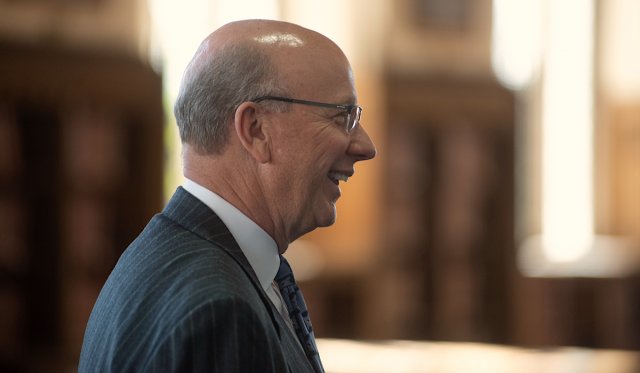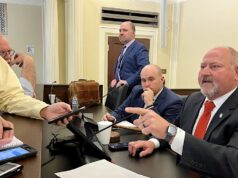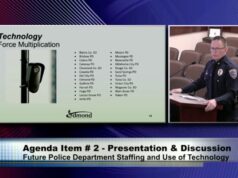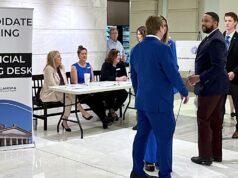

University of Oklahoma Board of Regents Chairman Gary Pierson runs a hell of a meeting. He communicates to media, he makes opening statements that potentially head off big questions, he moves business along and he has been known to speak bluntly to university administrators about what he wants.
“He’s a good chairman,” someone who would know told me recently.
Pierson was Gov. Kevin Stitt’s second appointment to the OU Board of Regents in 2019 and assumed its chairmanship in 2020 after being elected by his peers during an unusual October 2019 meeting that culminated with the resignation of Renzi Stone, who had also sought the position.
An attorney who was formerly a vice president with McAfee Taft and the CEO and publisher of The Oklahoman, Pierson is a serious person who lacks not for confidence. In 2018, he was one of the principle legislative liaisons for the business coalition Step Up Oklahoma that unsuccessfully proposed a massive package of taxes and reforms in an effort to break the Legislature’s partisan stalemate.
When Denver billionaire Phil Anschutz sold The Oklahoman later in 2018, Pierson became an executive vice president for the Anschutz Exploration Corporation in Colorado.
For the past year, Pierson has been leading the OU Board of Regents through a series of lengthy executive sessions — the term used for when public boards are allowed to meet in private to discuss legal, real estate, personnel and other matters.
The public’s understanding of what the OU Board of Regents discusses behind closed doors is limited. The lawsuit involving the questionable Cross Village student housing project has reached mediation and topped the list of litigation facing the university as detailed on the Jan. 28 meeting agenda.
That meeting began around 7:45 a.m. and featured roughly nine hours of executive session and about 13 minutes of a public meeting in which regents passed the bulk of their action items on a consent agenda vote without discussion. (OU President Joe Harroz did speak generally about a few items after the votes had occurred.)
When the meeting concluded, I conducted an interview with OU Board of Regents Chairman Gary Pierson to ask what he could reveal about the long executive session and the university’s goals for the 2021 legislative session.
Below is a transcript of that interview edited lightly for clarity. For quick reference, a copy of OU’s 29-page strategic plan can be viewed here.
Additionally, please note that the Legislature sent SB 1031 to Gov. Kevin Stitt’s desk on Monday, Feb. 8. The bill extends the temporary authorization for the meetings of public bodies to be held via video and teleconference until Feb. 15, 2022, or until 30 days after Stitt’s COVID-19 declaration of emergency ends, whichever comes first.
Jan. 28 interview with Gary Pierson
Tres Savage: I have a couple small questions for you.
Gary Pierson: You’ve never asked me a small question.
Savage: Well, uhh, what I was going to ask you is — I forgot to ask this of President Harroz. But the legislative session starts Monday (Feb. 1), so I hate my life. What are you interested in this year? What’s your message to lawmakers? I know, sort of right about when you got on the board, there was some movement and you were attempting to do some things in Tulsa. Obviously, with the pandemic and some other things going on, you know, (that) has changed where everybody is. So anything major you’re going to the Legislature for this year that you know of?
Pierson: Well, there’s two important things. And I’m not going to list them in order. But on just the functional side, it would be wonderful if the Legislature would modify the ability of the Open Meeting Act to have [meetings] by digital telephone conference, like we have had since about last April through November, where the press is still — and the public — is still invited in and can participate. But for committee members that are either traveling or live elsewhere, it just facilitates for a more consistent line of communication than if everybody has to gather all at once in a common location. There’s no downside to it. None of the public is excluded from anything. But it allows for more consistent, fruitful conversations. And this applies not only to the regents but to any board operating within the state, because people travel so much, and we’ve all learned that Teams and Zoom work. And although they may be a bit tiresome from time to time, it’s a good thing for us, and it’s a modernisation of the state. So that’s just a functional item.
Savage: OK, now, let me ask you real quick on that, because that’s going to be a big question. When you talk about that — because you [have a bit of a media] background (…) — do you believe that that’s a change that should be in perpetuity? That from from now on the University of Oklahoma could have its Board of Regents meet on a telephone conference eight times a year and never have an in-person meeting?
Pierson: No, I would never support that. What I would support is for — but yes, a permanent change. And again, this applies to all boards. But this really facilitates the constant movement of circumstances. And COVID really has demonstrated that, from time to time, we need to have a meeting that is on an unscheduled basis. And so that means, during a time when people can’t travel they’re supposed to get on airplanes to come to meetings. So what ends up happening is you don’t have the meeting. If we could do those kind of, let’s call them “filler meetings” on a more frequent basis, with Teams and Zoom, that would facilitate better oversight by the governing boards. It would also, I think, allow for the recruitment of increasingly good board members, because there’s some people that live out of state or travel a great deal that say, “I just can’t be on the beck and call to have to be in Oklahoma City or Tulsa,” as the case may be, or wherever, on very short notice. That allows if five regents can be together and two can’t, they can participate nonetheless. So it’s just part of the digital age.
Savage: So digital participation. But so you, you just want the ability for people to participate —
Pierson: — to communicate. I would never encourage doing away with in-person meetings, because the dynamics are better.
Savage: Is that something (where) the Legislature should try to thread that needle? Because you can look at Epic Charter Schools, just to take a body that is, you know, getting criticism from the public. They could say, “Well, we’re gonna have all our meetings — we’re always going to meet only on Zoom or only on telephone.”
Pierson: Well the Legislature doesn’t want to micromanage every board in the state. But I can see — now that you’ve asked the question — of a requirement that — I’m just picking a random number — that 50 percent of the meetings have to be in person.
Savage: OK, that’s interesting.
Pierson: Or, let’s put it this way. In the case of regents, regents have to attend at least 50 percent in person. Because you can’t dictate who’s going to be where when. But it would be an improvement for the state, and as far as the Legislature having to oversee it very tightly, they oversee appointments to boards in large part. And I don’t think the governor or any governor that I know is appointing incompetence, and competent people will want to meet in person when they can. But there are just certain times when you can’t, recognizing that these are — virtually everybody on all these boards has jobs. And they’ve got to accommodate those, too.
Savage: Circuit Engineering District 5 might be a different story. But you said your second — you had another deal.
Pierson: The second one is the same one that it always is, and that is funding. We rank really low in this state, and have for a very long time, on education. The world is evolving. Education is central to that, and communication. And we are trying to put in place — we are not trying, we have put in place a strategic plan that is very much a guide path into the future. But we need help funding it. And it’s not just sending money to higher education. It’s sending money, in our case, to do very specific things, including hire more and better faculty teaching higher-level classes and increasing our national ranking in terms of scholastics. That’s a good thing for the state as a whole. But we can’t do it alone. And as you know very well, Tres, that the funding consistently goes down in this state to higher education, partly in the belief that it’s just a sinkhole for money and there’s a lot of fat, a lot of excesses. This board at the University of Oklahoma and Cameron (University) and Rogers (State University) is ensuring that that’s not the case. We’re business people. We don’t want any fat in the organization, but we do need assistance on getting additional funds to be spent in a smart and designed way, not just randomly. And so we always need their help on that, and that’s got to go to the top of the list.
Savage: When you walk in — and you’re welcome to not answer this — when you walk into the building at the Capitol over there at 23rd and Lincoln, do you have to stop yourself from saying out loud that Step Up (Oklahoma) would have been more money and less reliant on oil and gas?
Pierson: I don’t think about it.
Savage: I think about it sometimes.
Pierson: That, you know, that’s got many variables and permutations to it. That was several years ago, prior to being a regent, and the balance of all that I no longer keep track of in the state of Oklahoma.
Savage: Depending on who you’re talking to, you might get points telling them that, because some of the people in Republican leadership are like, “If we’d have done that, we would have had more money and it wouldn’t have been all on oil and gas.” You would have a higher cigarette tax, higher fuel tax. Anyway, that’s neither here nor there.
Pierson: Ifs and wishes, right? Nobody saw oil going to negative $37 either. Or the COVID.
Savage: My dad’s thing was, “If ifs and buts were candy and nuts, oh what a merry Christmas we’d have.” So, anything else just big picture?
Pierson: I can tell you this. Big picture, I’m very encouraged by what the Board of Regents is doing. I’m very encouraged by Joe Harroz’s leadership and his leadership team. The faculty and the students really came together this fall and in the utmost difficult situation. Behind all the necessary things we’re doing to accommodate running a university during COVID, there are a lot of strategies taking place to advance the university on many, many different fronts and position it well for the future. None of it is frivolous. It is all business-driven with a single goal, and that’s to help OU, which in turn helps the state. So if we can ever steer clear of COVID — which will be sometime hopefully this summer — we can start getting back to the business of building our future. But I don’t want anybody out there thinking that all we’re focused on is COVID. We’re making advancements in all fronts and in a very, very serious way. I’m so proud of this Board of Regents for the sober way that they’re looking at everything.
Savage: You guys are putting in a lot of work, and that reminds me one other question, and this is more of a, “How do you tell the public (what you’re doing thing).” You know, if the public was looking at this, or if they just look at the timestamp, [they might] say you guys went in at 7:45 this morning (for) executive session (for) about nine, nine-plus hours in a room, talking through a ton of things. You kind of came out, (the) consent agenda had 20 items on it — 13 minutes later, the meeting’s over. If the public or lawmakers or whoever would say, “Well, they spent nine hours behind closed doors and 13 minutes here, that’s kind of a stark difference.” So how do you pitch it to the public to make them, I guess, trust or know that what you’re doing back there is going to come in ways that are revealed and people feel like they have buy-in? Does that make sense? Because when the [Black Emergency Response Team] group and a bunch of people were, you know, protesting and things like that — and even the stuff with Mr. (Jess) Eddy and all that stuff — you know, I feel like the perception can be that, hey, this is a very private board that’s governing this very public body. So how do you kind of assure people that the right thing is being done?
Pierson: Well, I guess there’s multiple parts to that question and to that answer. I would start with this from a regent’s standpoint: Look at the quality of the individuals that are appointed by our governor and approved by the Legislature and ask yourself the question, “Do any of these people have a propensity to waste time and effort? Or would they allow that?” The answer to that is, “No.” Second is, look at the seriousness of the leadership of the university and recognize that when we go into a meeting for nine hours, we all have other responsibilities. And so we’re not wasting any time. Out of our plus-or-minus nine hours today, there was probably idle chatter for 10 minutes. We only took one and a half breaks, if there is such a thing. One break was five minutes, so it didn’t really even count as a break. We take our jobs seriously. Now, that’s the “trust us” part of it. The other part of it — it’s very difficult, if not impossible — is if the public really wanted to understand everything that we’ve got going on, including all the minutia that we get into — and we do — and all the planning for the future, and not just tomorrow, but 10 years from now, then they really have to engage completely in it to understand, because everything relates to everything else. There’s no silos, and we’re actively busting down silos. So it’s not a matter of there’s a soundbite Joe (Harroz) can give or I can give that’s going to assure them that we are doing right by the taxpayers. They would have to hear the context of all the conversation and how it all relates to each other and understand that the regents probably — well, individually, I don’t know how many hours a month we put in studying of materials. It’s kind of like watching one of our teams. Just pick football, it’s a prominent sport. It’s easy to sit up in the stands and say, “I would have called X.” But the coaches on the field have all the context for everything that’s going on and the experience. And they’re applying it, and we have to trust them in that. It’s the same way with the regents and the leadership. I hope that analogy works.
Savage: I think that makes sense. I guess my follow-up question would be, can you give us a little bit of a sense — you know, there’s a list of the things that you guys could have talked about during executive session. Some of that’s lawsuits that you can’t get into specifically, but are we talking specific financial decisions, employment decisions? Do we hire this group? You know, what kind of things —
Pierson: Well, it’s the things that are covered by the executive session laws, otherwise we wouldn’t be in executive session. But, Tres, it’s really soup to nuts that falls underneath that. For you to understand, you’d have to be sitting in there because in some things we go into enormous detail (about) and some things we are more on a guidance level. But it’s all of those protected items under the executive session that have us in there. Otherwise, we would be out doing it in public. But what you really want is substance, and that’s what the public wants. One of the nice things about this Board of Regents is we’re available. People can talk to us about what’s going on. Joe makes himself available to talk about what’s going on. Everything we do is a byproduct of that.
Savage: Give me one example of the most exciting thing that you guys talked about today that’s going on. You can be as general as you need to, but what’s one thing that you guys went over today that you can give us a little bit more of that substance on that you think is exciting. Or maybe even might seem boring to people. But hey, we’re moving the ball forward on this so we can do X, Y, Z fiduciarily later?
Pierson: Well, that’s a difficult question, because we’ve covered a lot of things in nine hours. But the moves we’re making in the real estate area and the personnel areas are transformative for us. I can’t give you all the details about that, because it’s competitive in nature, and on the personnel it’s protected by state statute. But everything we’re doing is designed to improve OU. There are no personal agendas here. It’s all designed to improve OU, make the university feel like a welcoming place to everybody from everywhere, produce graduates that we’re all proud of because they’re productive citizens. And there are thousands of component parts of that. And so, some of those we discuss outside of executive session, some we discuss inside. But it’s a very broad question.




















